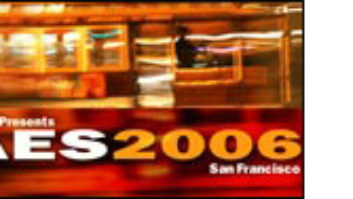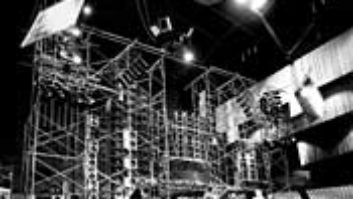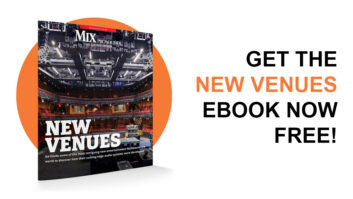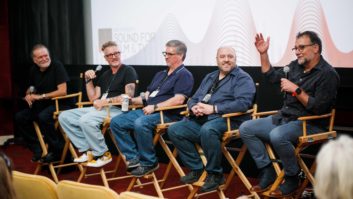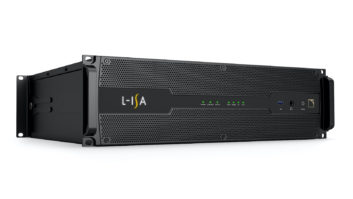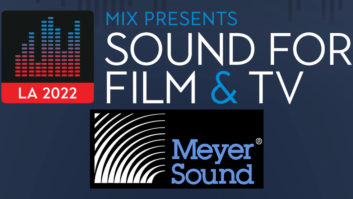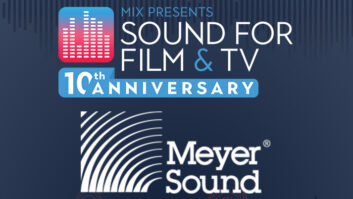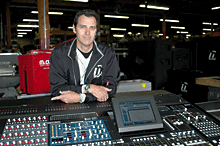

For many local crews, the events and installs are their calling cards. This also holds true for McCune Sound (San Francisco, www.mccune.com), but it’s the company’s 74-year history in the Bay Area and Southern California that gives them an extra edge.
Allan McCune inside the company’s warehouse
Photo: Doug Slater
Third-generation owner Allan McCune comes from a strong family lineage: His grandfather, Harry McCune Sr. (the company’s founder), started the business in 1932, building a sound system while working as an auto mechanic. He built several before he made one big enough to handle a dance band. “He was working at a bench and the guy next to him built a little sound system out of a car radio,” Allan McCune recalls. “He thought it was cool and made a little microphone. He would rent out the system and himself for $1 on a Saturday night and give it away for free on a Friday night. It got really popular and he started charging $1 for Friday, $1 for Saturday. He built a second sound system and hired a friend, and it just evolved.”
By the late ’60s, McCune Sound moved beyond rentals and started doing shows, which led to “hot-rodding” their systems to be powerful enough to go out with acts such as the Grateful Dead, Jefferson Airplane, Creedence Clearwater Revival and others. “During this time,” McCune says, “we talked to manufacturers to build better sound systems, speakers, amplifiers and mixers. Our clients were asking for more. John Meyer walked in the door during this time. My father took John out to the warehouse and took out what was considered a very good speaker at the time, an Altec 604, and said, ‘Listen to this. Can you make me a speaker that is 10 times as powerful as this?’ And we gave him the dimensions, which were big enough to fit into the belly of a [Boeing] 727 so they could be air-freighted around. About nine months later, John and our chief engineer at the time, Bob Cavin, came up with that speaker, which was a JM 3.
“They were an immediate hit. We were also building mixing consoles. Bob Cavin was a pioneer in designing and building consoles. Our systems were being used on Broadway, touring acts and Las Vegas show rooms.” Taking these systems out to Broadway was Abe Jacobs, who was “the first of the modern sound designers. Abe got his start at McCune touring with Peter, Paul and Mary and several other acts. Abe moved to New York and worked on Jesus Chris Superstar, Evita, Beatlemania and many other shows using our equipment.
“When you look back, you think of how obvious all this stuff is: having an onstage monitor mix or having a stage monitor, all the processing that is used. The first time that a stage monitor was used that we know of was for Judy Garland. It was late in her career. My father and grandfather were working on her show at the San Francisco Civic Auditorium. The rehearsal was not going well. My father came up with the idea of pointing a speaker at her. He jumped in the truck and dashed back to the office, grabbed a speaker, brought it back, put it on the corner of the stage, took a feed off the main system, turned up the amp and, like magic, the artist was happy.
“Live sound was the stepchild of radio and recording at that time. We bought radio or studio consoles and had to beef them up so they could take going in and out of trucks without failing.” From these few pieces of modified gear have come a huge selection, including a full complement of proprietary and Meyer speakers; and Midas, Soundcraft, Mackie and new Yamaha digital consoles.
McCune has just wrapped up the six-stage Monterey Jazz Festival and will be heading south to the L.A. Coliseum to install a line array system for the USC marching band for home games. “The marching band has got a sound designer, and we’re bringing in a very substantial sound system: big Meyer line arrays, a Yamaha PM5D digital console,” McCune relates.
McCune says the company has succeeded so long because “we’ve been able to survive the mistakes; we all make mistakes. Any job that has a problem becomes a big problem. If you do the opening of a Little League baseball season or soccer season with one mic and there’s a problem, it’s a huge problem as much as doing an outdoor festival for 100,000 people. Sometimes doing a large event with a big crew is easier because if you have lots of mics onstage and you lose one, not many people are going to notice. But [if] they’re announcing the teams and you don’t hear somebody’s kid’s name called, that’s huge. I would much rather deal with an outraged rock ‘n’ roll star than one of those kid’s outraged mothers who did not hear their child’s name.”
Sarah Benzuly is Mix’s managing editor.

Allen McCune talks about the early days of the music scene in San Francisco. Click here

